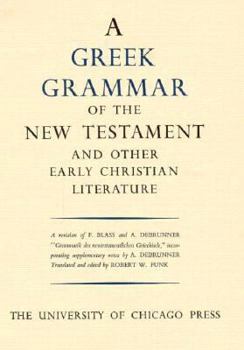Greek Grammar of the New Testament and Other Early Christian Literature
This work was created by Friedrich Blass, professor of classical philology at the University of Halle-Wittenberg, and was continued after his death by Albert Debrunner, professor of Indo-European and classical philology at the University of Bern until his retirement in 1954. The grammar has passed through ten editions from 1896 to 1960. Robert W. Funk, in translating this long-established classic, has also revised it and, in doing so, has incorporated...
Format:Hardcover
Language:English
ISBN:0226271102
ISBN13:9780226271101
Release Date:December 1961
Publisher:University of Chicago Press
Length:364 Pages
Weight:2.33 lbs.
Dimensions:1.0" x 7.7" x 10.3"
Customer Reviews
3 ratings
Useful in a pastors study
Published by Thriftbooks.com User , 19 years ago
This grammar is very helpful in a pastor's study (I am a pastor). It stays in my book bag most of the time. When doing sermon exegesis for the LXX or GNT I use Gordon Fee's "NT Exegesis" method. When preparing for my exegesis provisional translation of the text, I use Zerwick's Grammatical Analysis with the coded lessons to his Biblical Greek book. Then I use this book, BDF's Grammar, to read more indepth on the grammatical points that Zerwick describes. Usually in Zerwick there are 3 to 6 grammar highlights that he points out. So if I have time, I can learn a lot more by going to the referenced Grammar point in BDF and reading it through. For example when working on Philippians 3:12 this week I found three lessons in Zerwicks analysis...the first one dealing with INA and the subjunctive mood (indirect discourse application). While reading Zerwicks concise and very helpful grammar he actually cites BDF lesson 368 (that's this book currently being reviewed). So when I go there I find a lot more information on the exact same point along with quotations to ancient Christian lit/GNT. The broader context of everything in BDF also provides a clearer picture. In Zerwick's Analysis there is a clause about the point...in his grammar a paragraph...and in BDF you have half a page. And you can jump from one to the other in a few seconds. When you are done doing that, you feel like you just either refreshed yourself in an old grammar point, or learned something useful that you maybe never picked up in college or seminary. So I recommend Pastors who have some Greek knowledge to use Zerwick's Grammatical Analysis and Biblical Greek book...along with this one. The combination will give you the confidence you need to make a provisional translation of the text for your sermon each week. The way these books are laid out, it only takes about an hour or so of reading, max, to accompish this. Over time, you will find your Greek grammar knowledge actually sharpening even though you are not in school. Just work these steps into your sermon prep time. The point that Wallace makes in his review below about Classical Greek is important to consider. I have found it helpful to consult other Grammars or scholars online if there are questions along that line. One good group online is b-greek. Just google that and you will find it. The scholars on that group will often answer questions without any problem.
Review of Funk and Blass
Published by Thriftbooks.com User , 24 years ago
A well-written reference book which provides an in-depth look at Greek grammar. It serves as a wonderful aid in research or sermon preparation. Recommended for a specialist or someone with considerable familiarity with Koine Greek.
Review of Blass-Debrunner-Funk
Published by Thriftbooks.com User , 24 years ago
BDF is still the standard Greek grammar of the New Testament even after four decades. It is in the process of being revised (by a revision committee of eight members), but the revision will take several more years to complete. We felt it needed revision because BDF presupposes that the average reader has had much exposure to classical Greek prior to working in the New Testament. This is part of the reason that BDF is so hard to use: most NT students have not had exposure to classical Greek nowadays. Another reason is its cryptic nature, Teutonic abbreviations, and omission of 'normal' grammar. Nevertheless, even with these shortcomings, every responsible exegete of the New Testament must own a copy of this goldmine of information.Daniel B. Wallace, Professor of New Testament Studies, Dallas Theological Seminary





